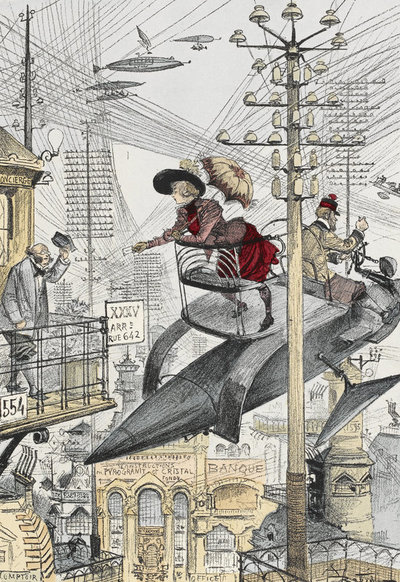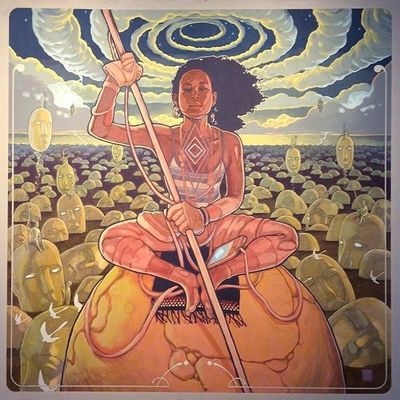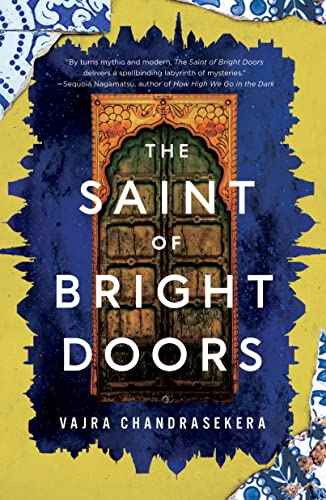|
Vajra Chandrasekera, The Saint of Bright Doors, Tordotcom, 2023. Audio version available. The Saint of Bright Doors is a fascinating fantasy novel dealing with cults and revolutions, the fragility of time, space and truth, and the sometimes abusive relationship between a child and his parents. Fetter has been raised by his mother to kill his father, the leader of a cult, and she tore his shadow from him at birth. Now adult, he has fled her and his home region to live in Luriat. He becomes a fixture of the community of refugees who end up in his area of the city and finds some peace for himself with his boyfriend and a support group for people who almost were the Chosen Ones. He still retains from his education the ability to see monsters that no one else can see and to levitate. But the balance and anonymity he has found will collapse when his father decides to come to Luriat. Fetter is a very endearing main character. Although it could be said that he stagnates in his marginalised life, he's mostly recovering from an abusive relationship with his mother and trying to find himself. Through the course of the novel, he'll have to take decisions and to try on new identities until he finally finds where he wants to stand. His awakening will be political, because the political and the religious are inextricably linked in Luriat, but also moral as he learns that he can't be a bystander. Luriat, the city, is very much a character in its own right. Chandrasekera paints it vividly: the different areas according to the different social status and castes, the bright doors of the title which are a mystery in itself, but mostly, the people who compose Luriat, and in particular the poor and the cast-off. The city is a maze that Fetter navigates and explores, and through it the unfair politics that holds it together and the hatred seeping through. The gallery of secondary characters could only emerge from this city: Koel, who belongs to the support group but also to a revolutionary group, Caduv, a newcomer to the support group, Hejmen, Fetter's privileged boyfriend, the members of the committee in charge of one of the bright doors, and Pipra who studies the bright doors. Chandrasekera does a tremendous job in painting them and anchoring them deeply in Luriat. The first half of the novel isn't fast-paced. It gives you time to explore Luriat and to get to know the characters better. The second half, on the other hand, increases the tension as Fetter needs to take action. Then in the last chapters, Chandrasekera flips the narrative and plunges us through a point of view that keeps us removed from more action. Because, in the end, The Saint of Bright Doors isn't a story about a revolution or a story about mysterious doors. It's a story about a man and his relationship with his abusive parents. The religious and caste hatred form the background, but also a delicate and wonderful take on truth and lies, and how they bend reality around us, both geographically (or geopolitically) and chronologically. Fetter can make his own choices only when he understands the world and the web of lies it is made of. Another element I particularly enjoyed in the worldbuilding is the mix of different-eras items, which is logical considering a certain revelation that happens later in the plot. But it gives a remarkable texture to Luriat and makes it feel truly lived in. The Saint of Bright of Bright Doors is a unique and impressive novel that plunges you deep into a fascinating world. Smart and thoughtful, it offers an examination of a fragile country held by exclusion and lies presented as truths, but also of a man who tries to find himself after the scarring left by his parents. More than highly recommended! If you've liked The Saint of Bright Doors, you may also enjoy
Comments are closed.
|
All reviews are spoiler free unless explicitly stated otherwise.
I only review stories I have liked even if my opinion may be nuanced. It doesn't apply for the "Novels published before 1978" series of blog posts. Comments are closed, having neither time nor the inclination to moderate them. |
WHAT IS THE MIDDLE SHELF?
The middle shelf is a science-fiction and fantasy books reviewS blog, bringing you diverse and great stories .
PLEASE SUPPORT AUTHORS.
IF YOU LIKE IT, BUY IT. |
ON THE MIDDLE SHELF
|
KEEP IN TOUCH WITH THE MIDDLE SHELF
|







 RSS Feed
RSS Feed
